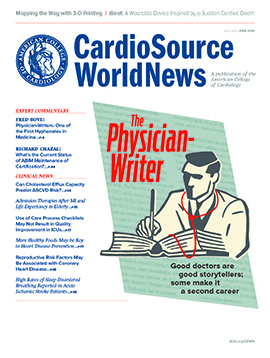Editor's Corner: Physician-writers: One of the First Hyphenates in Medicine | Alfred A. Bove, MD, PhD, Editor-in-Chief, CardioSource WorldNews
CardioSource WorldNews | In the academic world, we are compelled—as both duty and obligation—to produce new information on a continuing basis and propagate information through the written word. In academia, the written word has become the coin of the realm. Describing new science, writing chapters or entire books on scientific findings, opining on the value of new research: all of this adds to our reputation, garners respect from our peers, aids in scholarly promotion, and gives us an edge when competing for research funding.
For many investigators, writing endures as the least enjoyable part of academic life. The thrill of discovery, the presenting of new findings in front of our peers at a conference, passing on our knowledge during grand rounds; often, this is all much more preferable to the effort required to write a full scientific article. When we do write a journal article, it is with the idea that we will provide new information to our colleagues and allow them to improve their understanding of our physical world.
But what about writers whose purpose is to entertain with a good story that will hold a reader’s attention throughout the narrative? Many wordsmiths use examples from real-life experiences, such as the military, business, or sports, while others are masters at creating stories that entertain children. In all cases, the writer needs to first create a concept of their story in their head, then fill in details, and get to the chore of taking all their concepts and converting them into the written word. If a writer wants to create good stories from past experience, there is nothing better than the world of medicine to find a wealth of ideas that can be wound into great fiction. For centuries, physician-writers have made significant contributions to the world of literature through works of fiction and poetry.
Great writers are keen onlookers of life; often expending great effort to observe the world. With our constant exposure to patients and their afflictions, life literally parades past us on a daily basis (sometimes around the clock). In our unique position as clinicians, we witness the broad spectrum of human behavior, through individual responses to the stresses of illness or a cured malady, the joys of a newborn child, functional recovery from disability, and—outside of the office—the weddings and funerals that leave permanent memories of our interactions with the patients we care for. No wonder doctors take to writing. There is so much to say, so many experiences that can be the basis of short stories or full novels.
So how does a physician turn into a writer, poet, novelist, or screenwriter? Inspiration must come from within. A compelling desire to tell the stories we have lived, a desire to entertain, or a desire to spread an important message or lesson beyond a small circle of colleagues or students. Physician writers can be traced back to antiquity. Notable examples extend from Copernicus in the 13th century, Vesalius in the 14th century, Jenner in the 16th century, Conan Doyle in the 19th century, to the many contemporary writers who are also physicians. Their contributions have deepened our experience in medicine, not by adding to scientific knowledge but by enriching our own experiences through the vision and imagination of physician-writers.
Ultimately, many of us will be tempted to write stories that are not just a report of scientific data, but rather tales drawn from our experience and perspective. How does a physician start a career in nonscientific writing? Some will write a complete novel from an idea that has been brewing for months or years. Others will retire from their clinical work or take a sabbatical to acquire the time and tools to create the story they find that must be told.
What’s a good case study if not a story? Some physician-writers start out writing short stories, sometimes inspired by individual patient experiences. However the writing emerges, feedback from a friend or colleague will improve the work and help in creating the next story. If you have a compulsion to write a story, do it. If it is an interesting story, we will all want to share it.
Alfred A. Bove, MD, PhD, is professor emeritus of medicine at Temple University School of Medicine in Philadelphia, and former president of the ACC.

|
Read the full June issue of CardioSource WorldNews at ACC.org/CSWN |
Keywords: CardioSource WorldNews, Books, Research, Research Personnel, Writing
< Back to Listings

